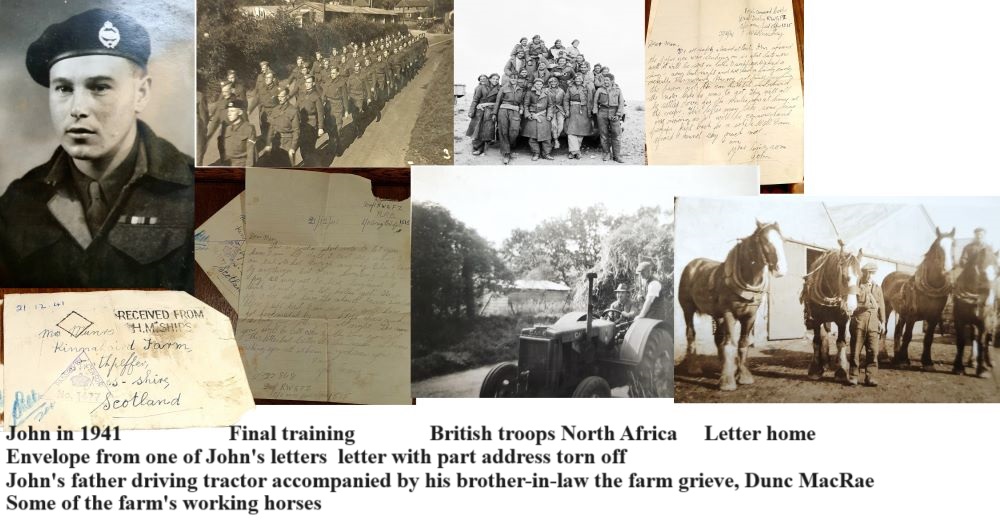
By February 1941 Germany’s Afrika Korps commander, Major General Rommel, had landed a force at the Libyan capital of Tripoli in support of the Italians who were struggling to contain the British. Rommel’s tank companies proved a formidable enemy and within a matter of weeks British forces had retreated to the Egyptian border.
Far from the heat of war in the Western Desert Scotland was suffering severe winter weather during which many of the farm’s lambs died of exposure to the extreme conditions. Grass sickness stopped the breeding of horses on the farm and the numbers of their working horse fell with some of the tasks previously undertaken by horses transferred to a paraffin-fuelled tractor.
John’s uncle, Duncan MacRae, awarded the Military Medal for bravery in the First World War, and grieve (foreman) on the farm during the Second lived with his family in one of the farm cottages close to the steading. In addition to firewood and farm produced food such as oats and potatoes, eggs etc he was paid £11. 10s a month in 1941. The farm employed five other men – for example cattleman Frank McLeod who received £105 a year and others whose wages ranged between 48 shillings and 54 shillings per week. John’s young brother, Roy, was paid between £7 and £13 per month, dependent on hours. John’s sister, Margaret, when not away working as a nanny earned the occasional £7 or £8 at busy times.
John’s father’s farm diaries rarely include any references to family events but on 3rd December 1941 he noted –
“John sailed. Cable sent from Glasgow – 2nd Feb about 9 weeks at sea.”
John had been transferred from the Seaforths to the newly formed Royal Armoured Corps, a tank corps that replaced the old horse cavalry regiments. In April 1939 the Royal Tank Corps had been renamed the Royal Tank Regiment, part of the RAC. John was recruited into the Reconnaissance Corps which was setup in January 1941, to carry out reconnaissance – scouting ahead of infantry divisions before they advanced – and disbanded in 1946. Recruits into this corps were selected through an intelligence test before being trained as drivers, wireless operators, mechanics and assault infantrymen. Many failed the test and were sent back to their own units. During World War 2 the Reconnaissance Corps served in the Middle East, East Africa, North Africa and the Far East.
During 1941 B battalion 3 RTR were in Greece fighting Italians but I have no evidence John was stationed there although some family members believe he was in Crete where fighting had spread from mainland Greece. Both were terrible bloody encounters and defeats for the Allies despite Britain’s determination to hold Crete which was regarded as essential to British interests as a vital refuelling base in the eastern Mediterranean since 1940. (The first reference John makes to being with the RTR is the following February).
The 3rd December 1941 is the date on the first of John’s letters I have.
Dear Mam,
We are safely aboard at last. I’m afraid the paper you was sending on is a bit late now. Well it will be sent on later I suppose. We had a sing-song last night and we had a fairly early reveille this morning. Has Roy got busy pushing the pram yet. He can hitch it behind the motor bike he was to get. They will all be settled down for the winter now at home at the neeps. This letter may take some time on arriving as it will be censored and perhaps kept back for a while. Well I am afraid I cannot say much more.
I am your loving son John.
I don’t associate John with sing-songs as the John who returned from war was quite reserved but at twenty and surrounded by comrades he comes across as carefree and with a keen sense of humour. Roy was his young brother and the pram reference is to their sister Chris’ recent baby. Neeps are swedes and it’s clear John is thinking about the life he left at home on the farm.
Just over two weeks later John writes home again, he’s contemplating the turn into the new year of 1942 but otherwise has little to say partly because of the army’s strict censorship rules, though he does hint at where he currently is –
“I can’t say where I am but it’s hot enough anyway. I have hardly anything on but I am sweating like a pig. We may not be here long and I think it may be a lot hotter yet.”
Leave a comment